Are you looking to get back on the muscle building track after reaching your 40s? We have got the best muscle building supplements for over 40 individuals in the article below, along with loads of advice on when and how much to take each of them.
Contents
Muscle building has immense benefits as it helps manage blood sugar, builds strength and stamina, and supports your joints. Your muscles grow and become stronger from the time you are born till you turn 30.
Unfortunately, after the age of 30, muscle mass starts diminishing either because you are physically inactive or your body is not getting enough protein to sustain muscle mass.
There can be other reasons, too, like your body has decreased the ability to convert protein to energy or lower production of hormones like testosterone or growth hormone, or it may be because of aging.
In this article, we will discuss the best muscle building supplements for over 40.

Best Muscle Building Supplements For Over 40
Sarcopenia is the loss of muscle mass related to aging, which significantly affects your ability to perform daily tasks. The physically inactive individuals are expected to lose 3to 5 percent of their muscle mass every decade after the age of 30.
So, if your age is over 40, then losing some percentage of muscle mass may make you feel weak, and you will have less strength and stamina. So, it’s best to take some muscle-building supplements after the age of 40 years.
Below, I am discussing some of the best muscle-building supplements you can take after 40 to increase your muscle mass, strength, and stamina.
#1. Protein Supplements
Protein is the key building block of muscles. You should consume high amounts of protein to gain muscle mass. You can get protein by eating a protein-rich diet like eggs, chicken, beef, and others.
However, those who don’t get enough protein from natural sources can take protein supplements. There are mainly three types of protein powders:
Protein Concentrates
Protein concentrates are produced by heating whole foods. They comprise between 60 to 80 percent protein, and the rest is fats and carbohydrates.

Protein Isolates
Isolates involve an additional filtering process in which the carbohydrates and fats are removed. Protein isolate powder contains almost 90-95 percent protein.
Protein hydrolysates
The protein hydrolysates are produced by heating protein-rich foods or adding proteolytic enzymes, which help break the bond between amino acids. The best thing about this form of protein powder is that your body quickly absorbs them. Thus, it helps raise insulin levels and enhance the growth of muscles very quickly.
Research shows that adding protein supplements can help increase muscle mass, mainly in individuals who are physically active every day. However, the effect is primarily seen in people who don’t get enough protein-rich food in their diet.
Remember that everyone will not get benefits after consuming protein powder. If you are already taking a high amount of protein in your diet, you won’t find much difference in the quality of life after taking protein supplements.
How much protein do you need daily to gain muscle mass, and when should you take it?
If you are physically active, you can take 0.5 to 0.9 grams of protein supplements per pound weight for best results. Many fitness enthusiasts recommend taking protein supplements 15 to 60 minutes after exercising for best results.
You might also like to read: The 3 Main Supplements For Diabetes Type 1
#2. Creatine Monohydrate
Creatine is a compound that is naturally produced by your body. Your skeletal muscles stores 5 percent of creatine, while 5 percent is stored in your brain and heart. It is found in natural sources like red meat and fish. So if you eat these foods, you can easily get one to two grams of creatine in a day.
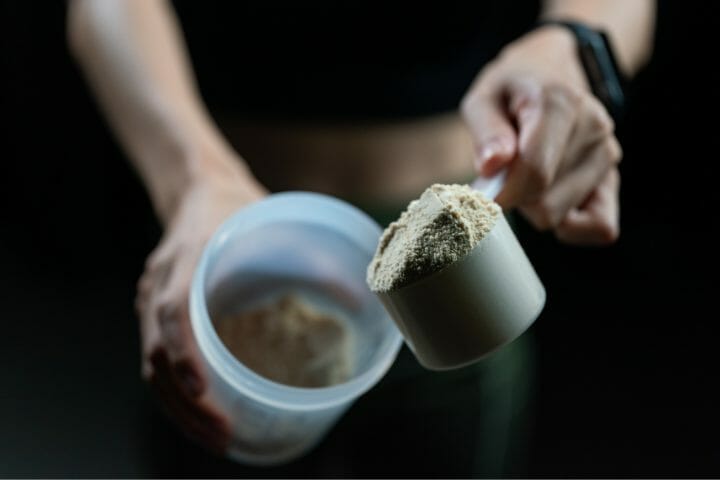
If creatine is found in natural foods, why should I take creatine supplements?
Creatine is an amino acid that helps in the production of Adenosine triphosphate) which is the primary energy source of your body. Unfortunately, your body can only store enough ATP for 8 to 10 seconds of high stress exercises, and after that, new ATP is produced to continue the exercise.
If your body does not have enough creatine, it cannot produce new ATPs, so you cannot continue your workout for an extended period. There comes the importance of creatine supplements. It helps to make new ATP and continue your work out comfortably.
Creatine monohydrate is a good creatine supplement that you can take after the age of 40. But it involves the loading phase, i.e., you need to take a high amount of creatine supplements for a few weeks.
How much creatine do I need to take, and when?
You need to take 5grams of creatine monohydrate four times a day during the loading phase (first couple of weeks).
But after the loading period, you can decrease the amount of creatine supplements, i.e., you can take just 3-5 grams of creatine monohydrate in a day.
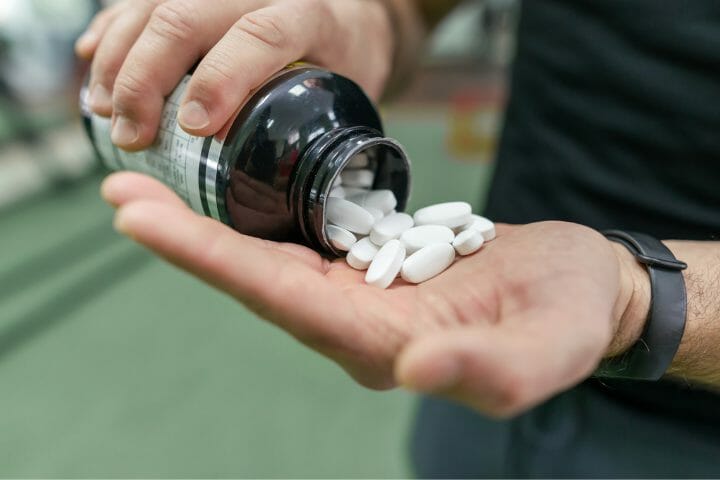
Is Creatine safe?
Creatine monohydrate is safe to take. But some individuals can have side effects like bloating, stomach cramps, digestive problems, or gas.
I will suggest drinking plenty of water and avoiding a sugary-rich diet or any unhealthy food to get rid of bloating or gas problems.
The side effects like bloating are mainly seen in most individuals’ loading phase. Once the loading phase gets over, the bloating issues reduce automatically.
You might also like to read: How Can Seniors Increase Their Energy Levels
#3. Weight Gainers
If you are above 40 years old and want to gain weight as muscle rather than fat, you can take weight gainers. Weight gainers are supplements that provide protein and help in gaining calories.
Many people think that the calories in weight gain come from protein as it’s highly essential for building muscles. In fact, most of the calories come from carbohydrates.
There are almost 20-60 grams of protein and 75-300 grams of carbohydrates in one serving of most weight gainer supplements.
#4. Glutamine
Glutamine is a vital amino acid that is produced in your body. Amino acids are molecules that are quite essential for building protein.

Which type of Glutamine do you need?
Glutamine exist in two form si.e L glutamine and D glutamine. Both are almost identical but differ slightly in the molecular arrangement.
L Glutamine is responsible for making protein in your body and serves other functions like maintaining the health of the intestine and immune system. But D glutamine is not that essential in human beings.
Where can you get Gluatmine from?
You need extra Glutamine in your body, especially when you want to build muscle or are ill or injured. You can find L glutamine either from foods or supplements.
Glutamine is high in animal products as they contain a high percentage of protein. For instance, in 100 grams of beef, you will find 1.2 grams of protein. However, some plant sources also contain a greater amount of protein, like in 100 grams of corn, you will find 0.4 grams of protein.
Glutamine is a vital part of proteins. So any food that is rich in protein contains some amount of glutamine. A typical diet usually contains 3 to 6 grams of glutamine. But the amount of glutamine intake may vary depending on the type and amount of food you consume in a day.
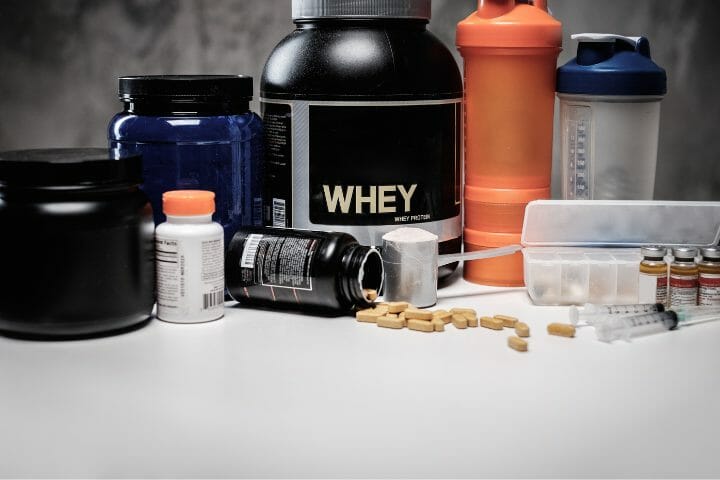
Why do I need Glutamine supplements?
Although glutamine is found in various animal and plant food, it’s impossible always to take glutamine from food and supply your body with full benefits. For instance, vegans and vegetarians have to depend only on plant-based sources for glutamine.
So, you can also take glutamine supplements, which will help improve muscle mass and strength after the age of 40. There are numerous glutamine supplements available on the market. You can look for L glutamine supplements as your body quickly absorbs them.
How much Glutamine should I take?
You can take 14 -15 grams of glutamine supplements daily for best results. However, if you are new to glutamine supplements, then it is best that you start with 5 grams in a day and then increase your dosage if required.
Some studies have also reported that glutamine supplements help decrease muscle soreness and help recover after vigorous exercises.
A study by the American Journal of Clinical Nutrition found that taking 2 grams of glutamine supplements per day increases the growth hormone level by 430 %, which is highly beneficial for individuals above 40 years. It is because the growth hormone production starts to diminish after the age of 30 years.
You might also like to read: Foods for Rebuilding Healthy Cartilage and Promoting Healthy Joints
#5. Amino Acids
Amino acids are building blocks of protein and serve other purposes like building neurotransmitters, various hormones, and others.Amino acids are compounds consisting of carbon, nitrogen, hydrogen, and oxygen.
Our body requires 20 different amino acids to function properly, out of which 9 are essential amino acids like histidine, which plays a crucial role in digestion and sexual functioning and various others.
Similarly, if I talk about lysin, they are excellent in absorbing calcium in your body and producing collagen and elastin, which is essential for your body.
Amino acids are a part of the protein. Whenever you eat protein-rich food, your body breaks the protein into small molecules, known as amino acids.Amino acids are high in high in protein foods like meat, soybeans, and fish.
However, you can take amino acids as supplements to improve muscle mass, mood, and performance in exercises.
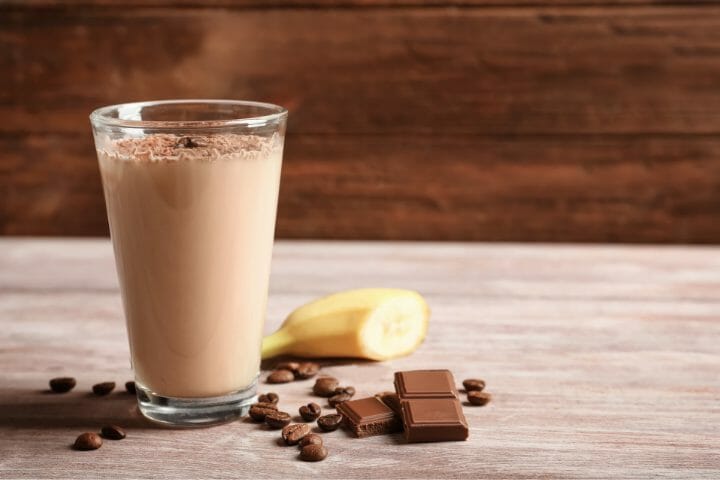
#6. Branched Chain Amino Acids
The term branched-chain refers to molecular structure. The amino acids that make branched-chain amino acids are as follows.
- Leucine
- Isoleucine
- Valine
Leucine is responsible for recovering bones, skin, and muscles in your body. Isoleucine aids in forming hemoglobin, and valine helps balance nitrogen in your body.
BCAAS plays a crucial role in following things
- Decrease muscle soreness
- Increases your appetite if you suffer from dreadful diseases like cancer or are malnourished.
- Increases muscle growth
- Reduces exercise fatigue
Branched-chain amino acids are naturally found in foods like brown rice, lentils, almonds, cashews, chickpeas, lentils, etc. But everyone can’t get plenty of BCAA from foods. So they can take BCAA supplements which will help build muscles even after the age of 40.
When is the best time to take BCAAs?
The best time to take BCAA supplements is before or after a workout. Most people who want to gain muscle take BCAA supplements in the morning and before going to bed.
There is no specific guideline regarding dosage. However, you can take 5-10 grams of BCAA supplements daily for best results.
You might also like to read: Best Protein Bars For Seniors
#7. HMB (Beta hydroxy beta methyl butyrate)
Whenever your body breaks an amino acid called leucine, it produces an HMB molecule. HMB is majorly responsible for building muscles.
However, HMB is produced naturally in very small amounts. So, you can take HMB supplements after the age of 40 to increase your muscle mass.
Many studies have shown that HMB supplements can improve your exercise performance, boost muscle growth, and help to lessen muscle breakdown, even in older adults.
HMB can benefit your body even if you combine it with other supplements like creatine, amino acids, and others.
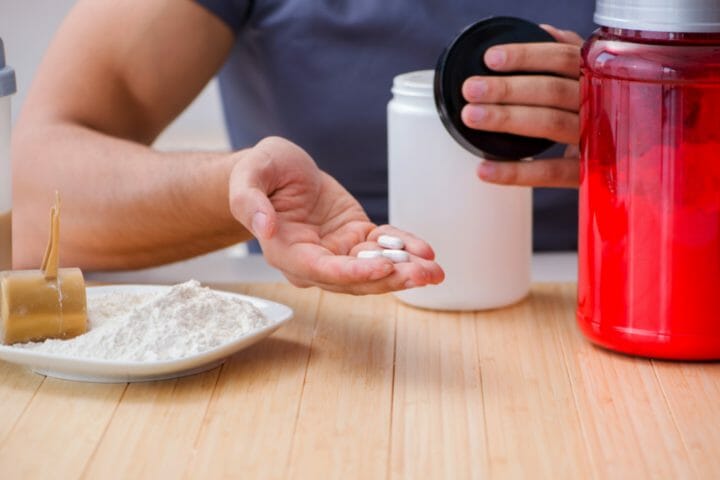
#8. Vitamin D
Vitamin D has immense health benefits. However, new studies have shown that vitamin D is also essential for improving muscle strength.
If your body does not have enough vitamin D after the age of 40, then your muscle strength and size decrease, which is the only reason for frequent falls in the older generation.
Although you can get vitamin D from the natural sunlight, everyone can’t expose their body to sunlight. So you need to take vitamin D supplements to increase muscle mass.
#9. IGF From Deer Antler Velvet
Deer Antler velvets are made by carefully giving animals like deer anesthesia and removing the velvet from their antlers. It is processed in powdered form and sold as a supplements.
These supplements are quite beneficial in improving muscle growth and mass even after 40. People also take these supplements to promote youthfulness, fertility, and others.
#10.Other Supplements
Vitamin B
Vitamin B is responsible for increasing muscle vascularity and testosterone production. So, you should take vitamin B supplements to enhance your muscular growth after the age of 40.
Potassium
Potassium helps in the growth of muscles. If your body doesn’t have enough potassium, then your muscles cannot appropriately use the energy released during metabolism. Potassium even helps in reducing muscle soreness which may occur during high strenuous exercises.

Calcium
Calcium is a powerful nutrient that is responsible for muscle growth and function.
Iron
Iron helps in building red blood cells and carries oxygen to muscles. It even aids in muscle building and repair. So you can take iron supplements after the age of 40 to regain muscle mass.
Vitamin K
Vitamin K supplements play an essential role in increasing muscle strength and mass.
Zinc
Zinc supplements will help you produce hormones like testosterone which is responsible for building muscles after the age of 40.
You might also like to read: The Ultimate Guide to Aging Well: Diet, Exercise and Health Tips for Seniors
Wrap Up
People above 40 years old and who maintain a sedentary lifestyle have faster muscle loss. It will have a high impact on the quality of your lifestyle. So it’s better to take some of the best supplements described above to regain your muscle mass after the age of 40.
At the same time, I will advise you to indulge in some physical activity to remain active throughout the day and lessen the chances of diagnosing Sarcopenia.
Thank you for reading, we hope we have helped you understand some of the most important nutrients that you will need if you want to gain muscle mass after the age of 40. For any doubts or queries, do reach out to us.
